County lines gangs have turned to snatching phones instead of dealing drugs to feed a growing £70m a year epidemic.
Gang members are grooming vulnerable young people to steal mobiles on Britain’s streets due to unprecedented overseas demand and softer sentences for those who are caught.
Stolen phones are being shipped abroad in bulk and sold around the world, a police chief warned, with some 80 per cent of the 80,000 phones stolen every year in London ending up overseas.
A Mail investigation today tracks a phone stolen from an estate agent on the capital’s famous Baker Street across the globe to a high-rise block in Hong Kong, where it sat alongside hundreds of thousands of other handsets.
And a police chief in charge suggested the likes of Apple and Google had the gift to stop the trade by making a phone worthless after being taken.
At least 230 phones were stolen every day on average in the UK last year – twice as many as five years ago and rising all the time.
London is the epicentre, making up roughly 75 per cent of phone thefts, but it is clear the problem is nationwide, with every major force recording thousands of stolen phones every year.
Even rural areas, such as Suffolk, Lincolnshire and Gloucestershire, cannot escape the problem.
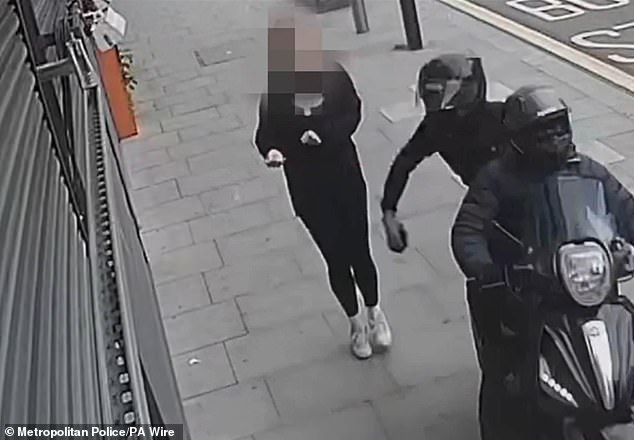
Gang members are grooming vulnerable young people to steal mobiles on Britain’s streets due to unprecedented overseas demand and softer sentences for those who are caught
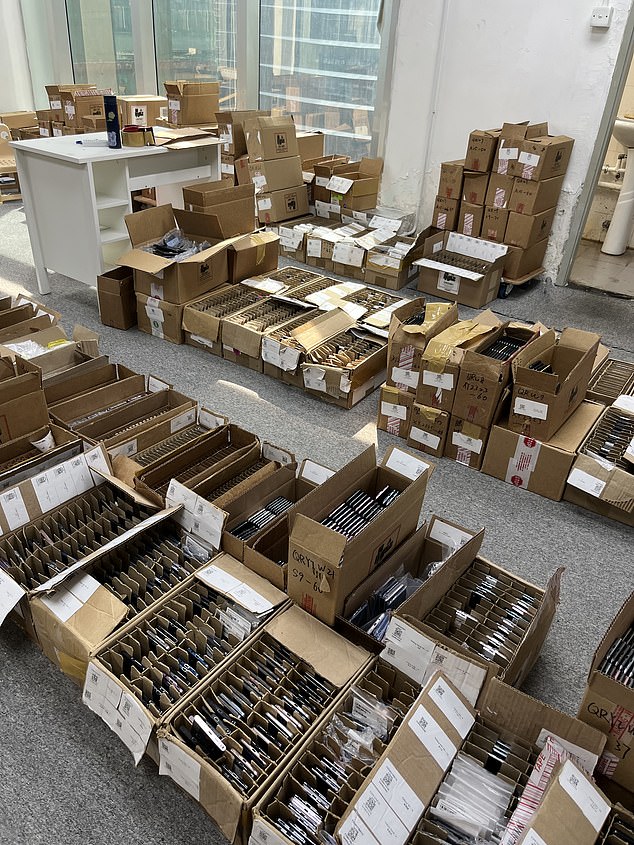
The Mail tracked phones stolen on the streets of London to business addresses in Hong Kong and discovered hundreds of thousands of used devices from around the world
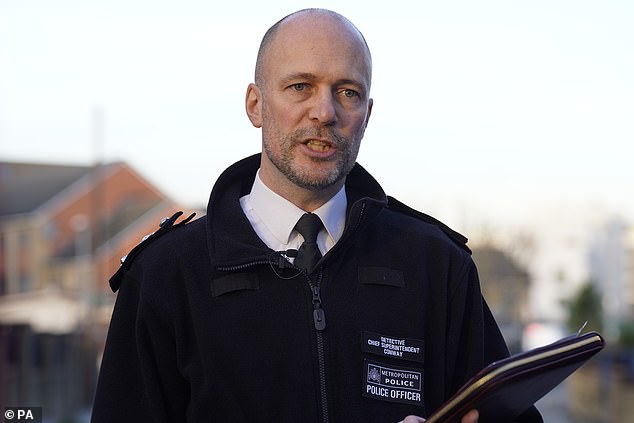
Commander James Conway from Scotland Yard said measures implemented by the force had seen a 13 to 14 per cent reduction in robberies and thefts in the first three months of the year but stressed ‘we can’t arrest our way out of this’
For top models, thieves can make up to £400 per phone they snatch, while sentences for theft, robbery and handling stolen goods are far more lenient than for dealing drugs. Phone thefts are estimated to cost Brits at least £67million a year.
Commander James Conway, Scotland Yard’s top officer on phone thefts, told the Mail: ‘These are the same sort of gangs that are also running county lines operations and dealing [drugs] but are getting increasingly involved in robbery and theft.
‘They can make a far greater profit than from dealing drugs in the same period of time with a lower risk from a criminal justice perspective.
‘The sort of sentences you see for drug trafficking or drug dealing offences, and those you might receive for a series of thefts as a young person are very different.’
Gang leaders use tried and tested methods to exploit young footsoldiers into snatching phones in the capital, often using specially adapted e-bikes which can reach speeds of up to 70mph.
‘Either they’re showering them with gifts of expensive trainers or clothing to draw them into a gang lifestyle, or they’re giving them gifts to saddle them with a debt, which that young person then has to repay into the criminal gang. That’s long been a methodology of recruitment used by those street gangs,’ Mr Conway said.
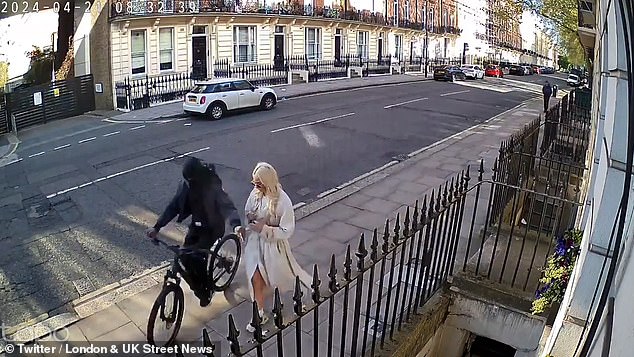
This terrifying phone snatch in Marylebone, central London, shows a thief taking a woman’s phone as he zooms past on an e-bike
The devices are then given to a handler, who packages the phones to be exported to an international hub where they are often sold in bulk into emerging countries.
‘The UK border is designed to stop dangerous things like guns and drugs coming into the country but in this instance it is the complete opposite – we have a criminal commodity moving out of the country,’ the top officer added.
Location data shows just under a third of phones stolen in the capital are sent to Algeria, while 20 per cent end up in China and a further seven per cent in Hong Kong.
The Mail visited a business district in Hong Kong and saw commercial units containing hundreds of thousands of phones imported from around the world, some of which had come from Britain.
One such address, on Hung To Road, had been the last location of an iPhone 11 Pro stolen from estate agent Dylan James, 41, on London’s iconic Baker Street – the home of fictional detective Sherlock Holmes.
‘Just ten days after my phone was snatched in London by a man on an e-bike it was pinging from this commercial district in Hong Kong,’ said Mr James.
‘It is truly incredible.’

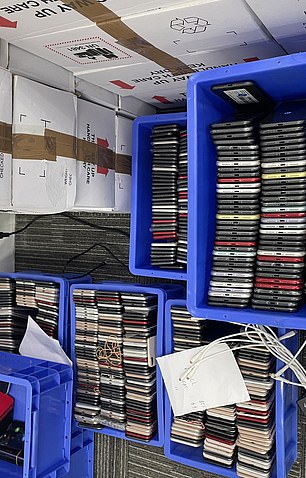
Estate agent Dylan James (left) had his phone stolen on London’s iconic Baker Street. Ten days later it was pinging from a business centre in Hong Kong – where the Mail discovered hundreds of thousands of used devices from around the world (right)
The surge in thefts has been driven by the overseas demand closing a ‘profitability gap’ in the market, Mr Conway explained.
‘In the noughties, gangs stepped back from this area because in the UK we severed that link between a stolen phone and services – so you couldn’t really use a stolen device in the same way,’ he said.
‘But they can be used in other markets, so there’s now this huge profitability in robbery again.’
Police forces have had some success in combatting the surge in thefts, but are calling on firms – such as cloud providers Apple and Google – to install a ‘kill switch’ that would effectively render phones useless when reported stolen.
It is argued this could cut demand overnight as the phone would hold zero value, unless it was stripped for parts which is more time consuming and less lucrative.
Mr Conway said: ‘We’ve offered the suggestion that if police provide the IMEI number for a phone [a 15-digit code unique to every handset] to a tech company and they sever the link between that device and cloud access, then it wouldn’t operate as a smartphone any more and would have next to zero value in that market.’
Apple said it had been ‘working on this issue…for more than the last decade’ and had made ‘significant investments’ in theft-prevention tools.
A spokesman from the firm added: ‘These features disrupt and discourage criminals from stealing phones in the hands of our users.’
Google said it already had anti-theft features that ‘help users to protect their devices before, during, and after a theft’.
‘Users in locations at risk of phone theft can simply switch them on and stay protected,’ the tech giant added.

Sonny Stringer (pictured) 28, stole 24 phones worth £20,000 in just one hour in London
In London, police ‘spotters’ have been deployed on e-bikes, covert operations have been launched against the handlers who collect phones from thieves and the Met has been working with the Border Force to clamp down on shipping the devices overseas.
‘We are looking at a 13 to 14 per cent reduction in robberies and thefts in the first three months of the year in London,’ Mr Conway said.
‘Which is a move in the right direction – but we can’t arrest our way out of this.’
One thief, Sonny Stringer, 28, stole 24 phones worth £20,000 in just one hour by driving his electric bike round the city at speeds of up to 50mph and snatching them from pedestrians.
He was jailed for two years at Isleworth Crown Court last August after being snared by City of London Police.
It is difficult to determine the exact scale of the epidemic on Britain’s streets due to differing recording techniques and the fact that many victims of theft and robbery fail to report crimes.
Data from Essex Police, for example, indicates a 55 per cent surge in phone thefts in just four years, to 1,383 last year.
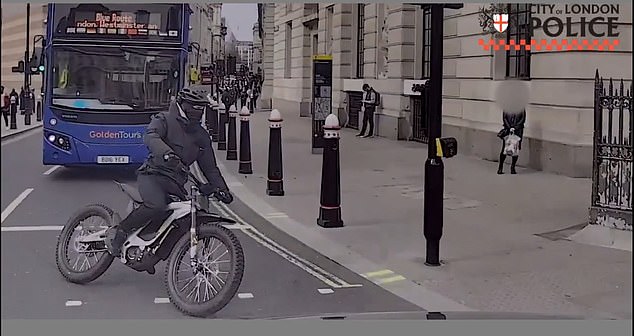
Stringer (above) drove his electric bike round the city at speeds of up to 50mph to snatch the devices from pedestrians before being caught and jailed for two years last August
In Kent, police recorded 1,722 mobile phone thefts in 2024, with 1,577 in South Yorkshire, 1,467 in the Lancashire force area and 1,115 in Nottinghamshire.
Forces in rural areas naturally record fewer phone snatches, with Suffolk Police recording 337 last year, 402 in Lincolnshire and just 34 in Gloucestershire.
In the West Midlands, there were 4,990 phones reported stolen in 2024.
In the year to November 2023, there were 7,159 phones reported stolen in Greater Manchester.
A targeted operation in Liverpool involving marking phones led to a drop in thefts in the city centre from 1,360 reports in 2022/23 to 490 in 2024/25, saving an estimated £500,000 worth of property.
Inspector Dan Green, of City of London Police, said even when crooks such as Stringer are caught with the devices on them only half of the phones can be reunited with their owners because it is so difficult to match them with victims.
‘We will know the phone is stolen, but if we can’t find the IMEI number, we can’t get into the phone, it’s not got a medical ID on it then we can’t find out whose phone it is,’ he said.
‘Also, someone might have reported their phone stolen but they don’t know their IMEI number so there’s nothing to marry them up with their phone.’












